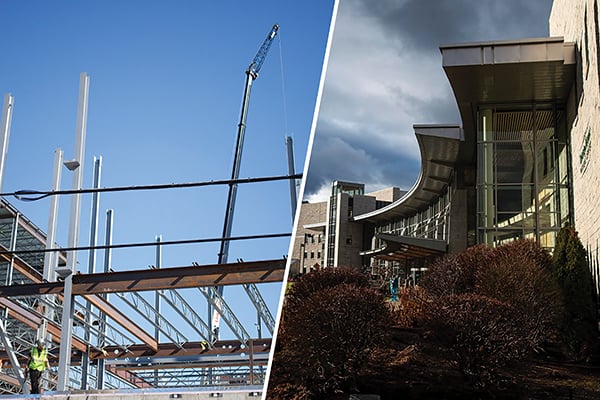By Liora Engel-Smith/VTDigger
When Northeastern Vermont Regional Hospital’s chief executive talks about the challenges facing his organization, housing is near the top of the list.
“It’s really astounding,” Shawn Tester, who heads the hospital in St. Johnsbury, said last month. “ We ended up having to rent a dorm from one of our local high schools for travelers because there’s literally no place for them to live when they come work at the hospital.”
Tester has plenty of company.
Every one of the leaders who spoke at a Feb. 16 press conference organized by the Vermont Association of Hospitals and Health Systems had a housing story to tell — from prospective employees who backed out of job offers for lack of housing to existing staff struggling with the state’s meager options.
“It’s become a huge barrier to our ability to recruit new people to the area,” Tester said. “I can’t solve my workforce problem without having the housing problem solved.”
Two years into a pandemic that thinned the state’s health care workforce, hospital executives are increasingly desperate to hire. But some have found that raises and bonuses are not enough. Would-be employees can’t find a place to live in Vermont’s tight housing markets.
So, hospitals are stepping in to help.
In Burlington, University of Vermont Medical Center is working with a local developer to build 61 employee apartments. Construction is scheduled to begin later this month.
By summer, Rutland Regional Medical Center executives hope to have a pipeline of rentals for their prospective employees.

Construction is scheduled to begin this spring on 61 apartments for University of Vermont Medical Center employees.
“We really don’t have a choice but to participate in the activity of trying to expand housing for our workforce,” said Brian Kerns, vice president of human resources at Rutland Regional.
Rutland Regional executives hope to fill an immediate need by reserving some existing housing for their employees, but Kerns isn’t ruling out new construction down the road.
“We don’t have plans right now,” he said. “It could come to it, I suppose, and that would even be more outside of our core business.”
Dartmouth-Hitchcock Health wants to develop 400 affordable units geared toward employees at its flagship campus in Lebanon, New Hampshire, on the Vermont border.
And in the Northeast Kingdom, Tester’s hospital is also looking to develop some land on its campus for employee housing.
New construction can be complicated and expensive, but executives at the UVM Medical Center believe it’s the best option in Burlington’s volatile housing market, said Al Gobeille, executive vice president for operations at the UVM Health Network.
The housing complex on South Burlington’s Market Street would cost UVM Medical Center $2.8 million. The Snyder Braverman Development Co. would own, build and manage the building. UVM Medical Center employees will occupy some or all of the 61 apartments for at least the next 10 years.
“It’s an investment,” Gobeille said. “We think that there’s good judgment in that (project), being (that it’s) something that can help us deal with the crisis we’re in.”
Gobeille noted that UVM Medical Center expects to spend upward of $120 million in the next year on temporary staffing.
The health network’s involvement in housing could pose some challenges. For one, leaders have been very vocal about the network’s financial challenges. Its recent public standoff with UnitedHealthcare over rate increases could hurt some 2,900 patients in Vermont and New York.
The network’s real estate project won’t get a close look from the Green Mountain Care Board, the body that oversees hospital growth in Vermont. In a Feb. 14 letter to the board, network executives argued that, among other reasons, the project is exempt from review because it isn’t a health care facility. The Green Mountain Care Board agreed, according to a Feb. 24 ruling.
The health network isn’t the first to dip its toe into real estate. For years, the Bennington-based Southwestern Vermont Medical Center has been renovating houses that eventually sell to employees.
Tester, of the St. Johnsbury hospital that’s been housing employees in a high school dorm, said the staffing crisis is forcing executives to think creatively.
“When you’re haying and the baler breaks and there’s a thunderstorm coming, you got to figure out how to fix the baler and get the hay up in the barn,” he said.



